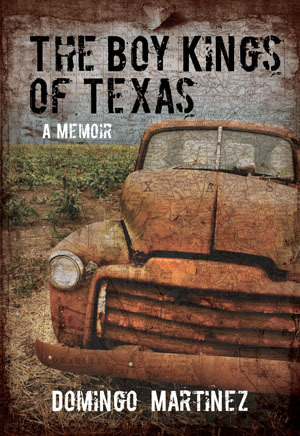A former colleague at Seattle Weekly, Domingo Martinez has been working on The Boy Kings of Texas: A Memoir (Lyons Press, $16.95) for the past 15 years. That doesn’t mean he was necessarily drafting tidy chapters each night about his Mexican-American family’s travails during the 1980s. “It was mostly written as e-mails to impress girls,” he explains, seated at Caffe Ladro on Lower Queen Anne. “It was never my intention to write a memoir.” Yet he slowly began to grasp how “foreign and alien” a place Brownsville seemed to new friends in Seattle, where he arrived some 20 years ago to reinvent himself.
A border town on the Gulf Coast of Texas, Brownsville “has remained completely timeless and insulated,” says Martinez. “Culturally, it exists entirely unto itself.”
Of course, it takes a long time for young Domingo—born in the U.S.—to realize those limits in The Boy Kings. There is no world outside his family, which has complicated roots on both sides of the border. His parents’ marriage is flawed, but there are four young kids to keep them together. As the family’s youngest child, Domingo enjoys the most freedom—switching to English, cutting school, embracing bands like The Cure—all of which marks him as an outsider. “This book is about alienation,” says Martinez, “about sublimation and shame and hiding—never being able to say the word ‘Mexican.'”
The Boy Kings is hardly a flattering portrait of Brownsville or the Martinez clan. “I thought I would be excommunicated,” says Martinez today. “I didn’t think this book would be read in Texas.” Fortunately, he laughs, “The First Amendment is covering my ass.”
The book is very much a coming-of-age tale, one that toggles between the Pacific Northwest and Texas. Down south, there are well-told vignettes about slaughtering pigs, smuggling a truckload of marijuana across the border, and how the author’s two sisters remade themselves as Valley Girls. Martinez writes of his desire to assimilate and distance himself from his Mexican roots: “The further away from speaking Spanish you are, the whiter you could be, and I wanted to be white. So white I was Jewish, actually, like Joel Fleischman, from Northern Exposure. It had been my only intellectual nourishment at this time.”
By then, the early ’90s, Martinez was already a stringer for the local newspaper and already scheming to leave Brownsville. “It was a very bleak future I had,” he says. Though Martinez remains close to a family now scattered across Texas, he adds, “I”m the only one who stayed away.”








